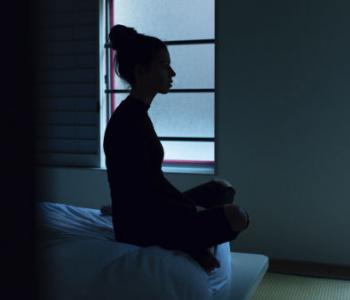Depression and Insomnia

The Link Between Depression and Insomnia
Medications for depression and/or anxiety may not mix well with medications for insomnia. If you are taking medications for depression and/or anxiety (like an SSRI), and you have trouble sleeping, please talk to your doctor about trying non-medicinal SleepPhones® headphones as a safer option to help improve de-stressing and sleep.
Learn to Boost Your Mood With Better Sleep
The relationship between depression and sleep is complex, tenacious, and at times, debilitating. In many ways, poor sleep and mood disorders have a kind of cyclic, chicken-or-the-egg relationship, wherein it's difficult to see where one begins and the other ends.
According to a study by "Dialogues in Clinical Neuroscience", about three quarters of those affected by depression also suffer from symptoms of insomnia. In contrast, 40% of depressed young adults suffer from hypersomnia, a condition in which a person has severe difficulty staying awake during the day.
Insomnia Increases Risk of Depression
Even a few consecutive restless nights can put a serious damper on one's mood. Correspondingly, a study published by National Center for Biotechnology Information suggested that people with insomnia are nearly ten times more likely to develop depression and are over 17 times more likely to develop clinical anxiety when compared to their well-rested counterparts. For these reasons, it's imperative that one strives to get quality, ample sleep.
Sleep Symptoms in Mood Disorders
The National Sleep Foundation found that nearly 20 million people suffer from depression comorbid with insomnia. Interestingly, hypersomnia, or excessive daytime sleepiness (EDS), is also associated with insufficient rest— sometimes even despite getting a full seven or eight hours of sleep a night. Individuals with EDS have difficulty waking from sleep and frequently experience distress and disorientation during the day that can impair functioning.
According to UCLA Health, one's age plays a significant role in insomnia. People suffering from depression in their 30s generally have a harder time falling asleep, while those in their 40s and beyond are more likely to wake up in the middle of the night.
Depression and Sleep Apnea
Unfortunately, the side effects of chronic sadness don't stop at insomnia. Obstructive sleep apnea, a breathing-related sleep condition that interrupts deep sleep, is also linked to depression.
According to a study by The Journal of Clinical Psychiatry, people with depression are over 500% more likely to suffer from obstructive sleep apnea and other sleep-disordered breathing problems than those without a depressive mood disorder.
An Array of Mood Disorders
Major depressive disorder is an umbrella term commonly used for long term depression, which is characterized by unwavering sadness as well as an inability to carry out acts of daily living. However, several forms of this disorder exist, each with their own sleepless symptoms.
Seasonal affective disorder (SAD) is one subgroup of depression that, like its name suggests, is triggered by the changing of seasons when the patterns of daytime light shift and cause the body's "internal clock" to adjust, or as it were, fail to adjust. Because our circadian rhythms are regulated by sunshine, the short autumn and winter days cause desynchronized sleep schedules and trigger depression.
Bipolar disorder is a manic-depressive illness defined by severe mood changes, in which one cycles between periods of highs (mania), lows (depression), and moments of stability in between. As opposed to depression, mania is characterized by abnormal periods of elation and a decreased need for sleep. Often, an individual in the midst of a manic phase will report feeling well-rested after only three hours of sleep. During depressive episodes, many or all symptoms of depression are evident, including loss of energy and interest.
More Than One Kind of Insomnia
- Acute Insomnia is generally caused by a life event, such as a marriage, divorce, retirement, or any other significant life change. Symptoms for these brief episodes of sleeplessness can usually be cured relatively quickly with appropriate non-medical treatment. Acute insomnia is often grouped with onset insomnia (trouble falling asleep at the beginning of the night) and maintenance insomnia (the inability to stay asleep).
- Chronic insomnia can be caused mood disorders, medical conditions, unhealthy sleep habits, substance abuse, and many other factors. This long-term pattern of restlessness is usually classified by three or more months of sleeping problems.
- Comorbid insomnia occurs with another condition such as mood disorders like anxiety or depression or physical conditions like arthritis or severe back pain.
Treatment and Coping
Whether the root cause of depression is insomnia or vice versa, current research indicates that depression is often misdiagnosed. In fact, a study by John Hopkins Bloomberg School of Public Health suggests up to 86% of patients being treated for depression do not actually meet the specific criteria for the mood disorder. For this reason, it can be beneficial to explore non-medical solutions to your insomnia first, before jumping into sleep aids.
- Use SleepPhones® headphones for a better night's sleep. You can listen to relaxing music, soothing meditations, and/or soundscapes without the hassle of bulky headphones or irritating earbuds. AcousticSheep uses clinically-proven sound technology to ensure a better night's sleep.
- Although it may be the last thing you want to do, try to get some exercise throughout the day. Physical activity can do wonders for counteracting symptoms of depression and insomnia. If music is a must during your workouts, try RunPhones® headphones for higher sound quality and added comfort.
- Limit caffeine and alcohol intake. Remember, a healthy body inspires a healthy life. Stick to a 2:00 pm to 3:00 pm cut off for caffeine and a one drink limit as a nightcap.
Want to see what people are saying about SleepPhones® headphones? Click here to learn more about how to increase the quality of your sleep naturally.
Find more about seasonal affective disorder (SAD) here.
Find more about insomnia here.
